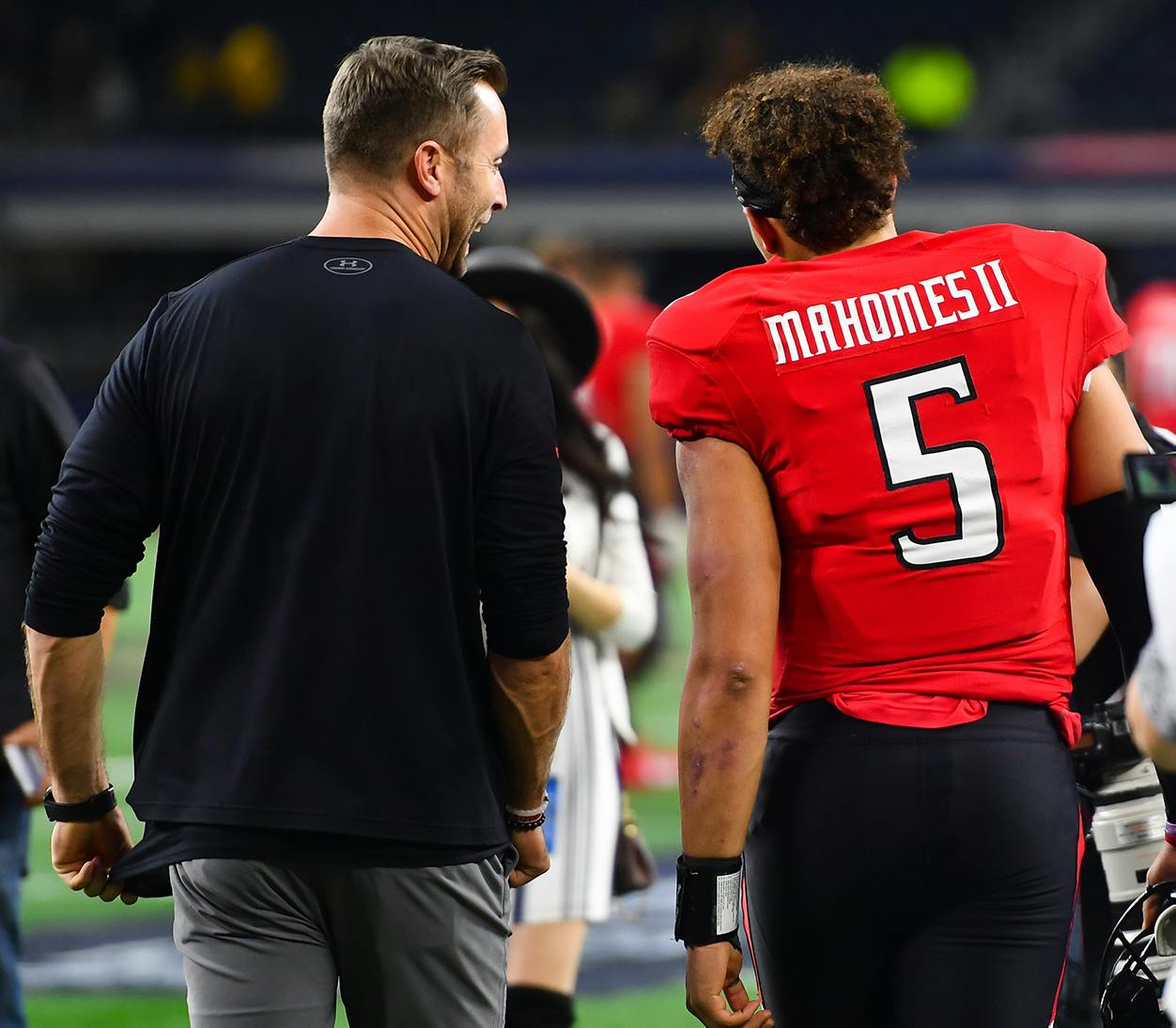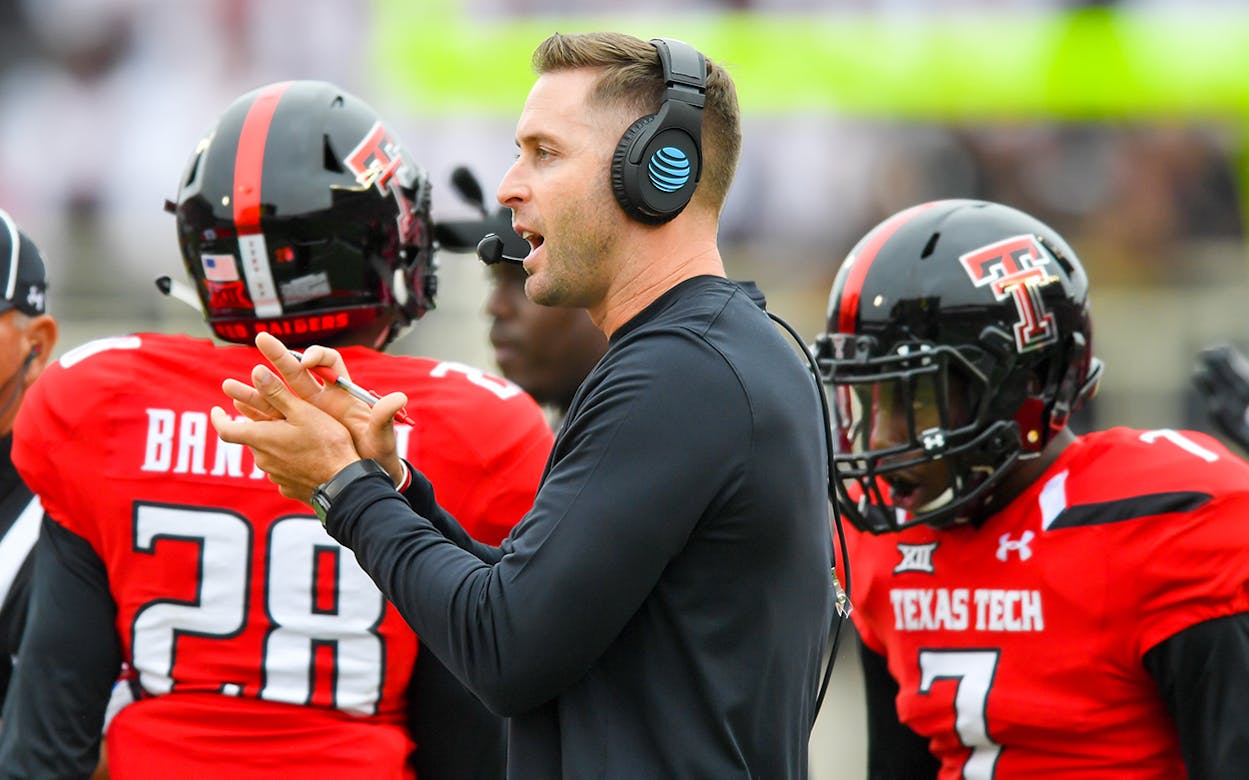Kliff Kingsbury’s head coaching career at Texas Tech was largely undistinguished. The team posted a 35-40 record and won only one of the three bowl games it appeared in during his tenure. He was fired in November, six seasons after returning to place where he’d made his name as a quarterback.
Kingsbury appeared, briefly, to take the familiar route for young hotshots ousted from head coaching jobs. He signed on in early December as the offensive coordinator at the University of Southern California, which was certainly a step down, but was nonetheless the kind of opportunity in which a marginal success could lead to a second chance as a head coach. But a funny thing happened to the San Antonio native on his way to Southern California: he somehow became one of the hottest names in the NFL’s head coaching search.
Failing upward happens in every industry, but it’s rare in football, where teams searching for head coaches are often in that position because the previous guy was a flop. But Kingsbury’s position is unusual. He’s a young coach, considered an offensive guru, and he’s coached some of the hottest quarterbacks in the NFL. So though it’s unconventional for a guy to go from being fired from a mid-tier school in a soft NCAA conference to a head coaching gig at the NFL level, well, Kingsbury’s an unconventional guy.
On Tuesday, the Arizona Cardinals swooped in and hired Kingsbury, who was also being heavily pursued by the New York Jets. The move was controversial for a few reasons—not the least of which is that the Cardinals, who’ve struggled for the past several seasons and fired their previous coach after just one year, are now in a position to convince fans in Phoenix that Kingsbury can succeed at what he failed to do in Lubbock.
For the past few weeks, Kingbsury was locked in a battle with USC over his future. Both the Cardinals and the Jets reached out to the university to ask permission to interview Kingsbury. Such calls fall into a nebulous spot among NFL rules—teams are required to request permission, but they aren’t penalized for conducting an interview without one—and USC declined. That decision led to speculation that Kingsbury might bet on himself, buy out his own contract, and walk to whatever NFL job wanted him.
On Monday, Kingsbury’s name vanished from USC’s website, and he scheduled his meetings with the Jets and the Cardinals. It’s unclear what happened—it’s possible that Kingsbury and the university quietly agreed on an exit, or that USC Athletic Director Lynn Swann relented and allowed the teams to interview the coach—but regardless, he somehow finagled his way out of a job that he agreed to just a month earlier and into an opportunity to lead an NFL franchise.
As much as the Cardinals’ decision speaks to Kingsbury’s reputation, it probably says even more about the current state of the NFL, and what a viable head coach looks like in 2019. This past season offenses put up massive points, spurred by unparalleled quarterback play. Middle-of-the-pack franchises like the Kansas City Chiefs were suddenly Super Bowl contenders because of young quarterback like Patrick Mahomes, whom Kingsbury coached at Tech. Basement-dwellers like the Cleveland Browns were feared and respected because of the success of Baker Mayfield, who followed Mahomes for his freshman year under Kingsbury in Lubbock before transferring to Oklahoma. Even the Broncos’ Case Keenum, who has seen only intermittent success in the NFL, was turned into an all-time college great with help from then then-offensive coordinator at the University of Houston: Kingsbury.

Kingsbury almost exactly matches the profile of a hot NFL coaching candidate right now, in other words. It’s a guy who’s under 40, offensive-minded, branded an innovator and a quarterback whisperer. He looks like Rams head coach Sean McVay (the 2017-2018 NFL Coach of the Year), or like Bears head coach Matt Nagy (the favorite for the 2018-2019 award). Their offenses score a ton of points—Kingsbury’s NCAA offenses averaged almost 42 per game—and they have young quarterback to mold into a potential superstar. Most importantly, they can win fast. The Rams went from 4-12 to 11-5, then 13-3, under McVay. The Bears spent four seasons in last place in the NFC North before storming the division with a 12-4 record in Nagy’s first year.
Selling the Cardinals fanbase on Kingsbury as the guy who went 35-40 at Texas Tech might be a stretch, but selling them on him as the second coming of Sean McVay might carry a lot of water out in the desert. (It was likely no coincidence that an early press release from the Cardinals, since amended, stressed that Kingsbury and McVay were friends.)
And yet, there’s a lot of questions that definitely won’t be satisfied by an association with McVay. Will the resources of an NFL franchise give him the chance to succeed that a school like Texas Tech could not? Why did he take the job with USC in December, knowing that the NFL was likely to come calling as soon as the coaching carousel began at the start of the new year? Did the perceived scarcity of Kingsbury—the fact that USC initially refused to let him interview for higher-profile, higher-paying jobs—turn him into a hotter candidate than he’d have been if he’d been on the open market? Most importantly, can he turn Cardinals QB Josh Rosen—an early first-round pick in last year’s draft—into Patrick Mahomes, or will Rosen turn Kingsbury into Steve Wilks, the Cardinals coach who preceded him, and who was fired after just a single losing season?
All of those questions are open right now, and we’ll only learn the answers to some of them as the 2019 season kicks off in the fall. Either way, though, Kingsbury’s failure with the Red Raiders have left his arrow pointing in one direction: straight up, with the unlikely expectations of an NFL franchise on his shoulders.
- More About:
- Sports
- Texas Tech
- NFL
- Lubbock








